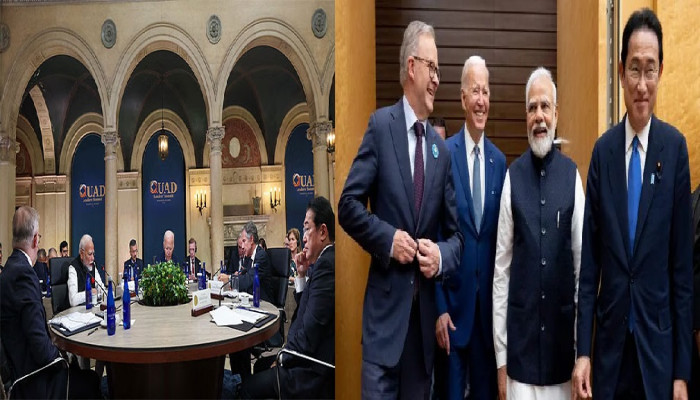Wilmington Declaration Positions Quad as a ‘Global Force for Good’
- In Foreign Policy
- 01:35 PM, Sep 25, 2024
- Ramaharitha Pusarla
On September 21 President Biden hosted Prime Minister Modi, Japanese Prime Minister Fumio Kishida and Australian Prime Minister Anthony Albanese for the fourth in-person Quad Leaders’ Summit at his home in Wilmington, Delaware. Wilmington Summit marks 20 years since Quad’s inception. Over the two decades, the Quad has transitioned from being a disaster response assistance forum to a force for ‘global good’. However, with leadership change in the offing in the US and Japan, speculations are rife about its vivacity.
Biden administration has elevated the Foreign Ministers level meeting to a Leaders’ Summit in 2021. The Wilmington Summit is the sixth iteration of the Leaders’ Summit and it includes two virtual editions. The Quad was resuscitated twice and the current version Quad 3.0 revitalised at the height of the Covid has attempted to address the prevailing global challenges of the times. Broadly the framework encompassed the 21st century challenges- Covid and Global Health, Infrastructure, Climate, People to People Exchange and Education, Critical and Emerging Technologies, Cybersecurity and Space.
Subsequently, to strengthen ties with the allies and partners in tackling the global challenges, the US launched the Indo-Pacific Economic Forum (IPEF) in 2022. IPEF has four broad pillars- Trade, Supply Chain, Clean Economy and Supply Economy. Given, the US reluctance to open its economy, the progress on this front has been rather tepid, especially on the trade front. New minilaterals branched out of the Quad since 2022 potentially diluting the momentum of the Quad.
Strengthening strategic partnerships, Quad Partners along with like-minded countries soon formed new groupings like- India, Israel, UAE, US (I2U2), Australia United Kingdom United States (AUKUS), and SQUAD (US, Japan, Australia and the Philippines). All of the spin-offs led by the US have an overlapping agenda. All these are offshoots of the US’s Indo-Pacific Strategy and emanate from its perceived threats from a rising China.
China’s burgeoning influence in the Indo-Pacific led to Quad’s revival in 2017 by former President Donald Trump. Soon, the construct of the Indo-Pacific became popular. The United States Pacific Command was renamed as United States Indo-Pacific Command and the concept of “Free and Open Indo-Pacific” was formalised. Devoid of the military aspect, the Quad group essentially evolved to challenge China in the Indo-Pacific region. Countering China has been the unwritten underpinning of the Quad.
With the traditional security aspect of it now outsourced to the AUKUS and SQUAD, the de facto security alliances, the Quad has expanded its agenda to include the “non-traditional security challenges” which aggravated in the aftermath of the Covid.
India expected to host the summit deferred it to next year honouring Joe Biden’s request. Amid the complex geopolitical crisis with wars in Ukraine, the Middle East and expansionist adventurism in the South China Sea, the 5400 words Wilmington Declaration has essentially brought out to fore two aspects. The first one being, unsparing oblique references to the elephant in the room, China and endeavours to strengthen cooperation among partners on the “non-traditional security challenges”.
With open, free, inclusive, stable, prosperous, secure Indo-Pacific as the guiding spirit of the Quad, while doubly reassuring that “Quad isn’t against anyone” the declaration is generously splashed with obvious and unmissable remarks like “strongly oppose any destabilising or unilateral actions that seek to change the status quo by force or coercion”.
Reaffirming their commitment and making the assertions more pronounced, the declaration states, “We express serious concern over recent dangerous and aggressive actions in the maritime domain. We seek a region where no country dominates and no country is dominated—one where all countries are free from coercion, and can exercise their agency to determine their futures. We are united in our commitment to upholding a stable and open international system, with its strong support for human rights, the principle of freedom, rule of law, democratic values, sovereignty and territorial integrity, and peaceful settlement of disputes and prohibition on the threat or use of force in accordance with international law, including the UN Charter”.
The initial Paras of the declaration have been unequivocal about the major traditional security challenges in the region and reinforced their centrality and respect for the regional institutions- Association of South East Asian Nations (ASEAN), Pacific Islands Forum (PIF) and the Indian Ocean Rim Association (IORA).
In addition to China’s coercive militarisation and flagrant incursions into the East China Sea, and the South China Sea, the global conflict in the Middle East has heightened concerns about maritime security in general and the Indo-Pacific region in particular. To monitor, deter and check unlawful behaviour, Quad announced the launch of the Maritime Initiative for Training in the Indo-Pacific (MAITRI) under the Indo-Pacific Partnership for Maritime Domain Awareness (IPMDA). India will launch the inaugural workshop next year.
Concurrently to uphold rules-based maritime order in the Indo-Pacific, the Quad Maritime Legal Dialogue and the Quad Indo-Pacific Logistics Network pilot project to rapidly and effectively rescue civilians during disasters by airlifting were launched. With a focus on enhancing interoperability and advancing maritime security Coast Guards of Quad partner countries plan to launch Quad-at-Sea Ship Observer Mission in 2025.
Maritime Security and prosperity are interlinked. Recognising the need for robust and quality infrastructure to improve connectivity, the Quad intends to hold the Quad Regional Ports and Transportation Conference in 2025 to be hosted by India in Mumbai. To secure underwater connectivity networks and make them China-proof, the Quad is now stepping up to help the Pacific Island countries.
Notable outcomes of the Quad Cancer Moon Shot on combatting cervical cancer, a preventable cancer. India has committed to providing HPV sampling kits, detection kits and vaccines worth $7.5 million. Through its $10 million WHO’s Global Initiative on Digital Health India will offer technical assistance. Serum Institute of India in partnership with Gavi will support orders of 40 million HPV vaccine doses.
Quad countries signed an MoU for the Semiconductor Supply Chains Contingency network. Quad plans to launch Quad BioExplore Initiative, a joint AI-driven exploration of diverse non-human biological data across all partner countries.
US in Partnership with Indian Institutions plans to establish a first-of-its-kind open RAN (Radio Access Network) workforce training initiative in South Asia. As part of the Quad Climate Change Adaptation and Mitigation Package (Q-CHAMP), India plans to invest $2 million in new solar projects in Fiji, Comoros, Madagascar and Seychelles. India has also announced fifty Quad scholarships.
Quad has taken serious cognisance of the indiscriminate ballistic missile firing by North Korea in contravention of the UNSC resolutions, “worsening political, economic, security and humanitarian situation in Myanmar” and called for swift implementation of the ASEAN-Five Point consensus. It backed the two-state solution for Israel and condemned terrorism in all forms. The list now includes the 26/11 Mumbai attacks, the Pathankot attacks and the October 7, 2023 Hamas terrorist attacks.
Making a stern note of the Chinese military posturing the SCS, the Quad opposed efforts to disrupt offshore resource exploitation activities, reemphasised upholding freedom of navigation and overflight, reaffirmed that maritime disputes must be resolved peacefully and highlighted the 2016 Arbitral Award on the SCS. Acknowledging the impact of the Ukraine War on developing countries, the Quad reiterated, “the need for a comprehensive, just, and lasting peace in line with international law, consistent with the purposes and principles of the UN Charter, including respect for sovereignty and territorial integrity”.
Quad backed the inclusive representation of countries in the reformed Security Council. Though Biden’s hot mic “(Xi Jinping is) looking to buy himself some diplomatic space, in my view, to aggressively pursue China’s interest…. (China continues to) behave aggressively, testing us all across the region on several fronts, including on economic and technology issues” clearly reflects the US's growing discomfort with China, the blueprint of the Quad is to be a “global force for good”.
Clearly, all other countries in the Quad except India have now forged a security alliance to confront China. As the traditional security provider of the Indian Ocean Region, the US’s Indo-Pacific Strategy is incomplete without India. India is indispensable to counterbalance China. India is very clear about its role in the Quad.
Deftly aligning with the Quad’s approach and expectations, India is using the group to harness opportunities to build its capacities to become a self-reliant technological power. Augmenting strategic interests and seeking to enhance capabilities in building a stable, secure and safe maritime front India is actively engaging in Quad’s maritime initiatives.
Certainly, the Quad is “here to stay” and “more strategically aligned than ever”. But the strategic dynamic of the Quad has taken a new turn. The expansive Quad’s agenda no longer fits the definition of a traditional security forum.
Reference







Comments